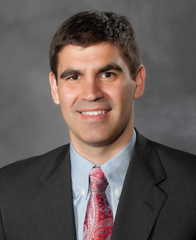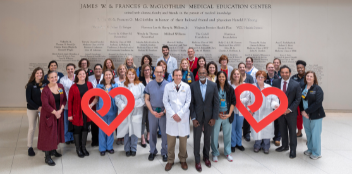TAVRs and MitraClips Among the Options
A few years ago, transaortic valve replacements (TAVRs) were a new and rare procedure. These days, “we’ve completed around 400 at VCU Medical Center. It’s becoming a standard thing,” said interventional cardiologist Dr. Zachary Gertz.
 Dr. Zachary Gertz
Dr. Zachary Gertz
What may be the latest procedure at other institutions is often commonplace at VCU Health, where Gertz and other members of the team remain at the forefront of research. They are leaders in offering treatments for patients with malfunctioning heart valves, including those with complex conditions not treated at most hospitals.
The heart has four types of valves: aortic, mitral, pulmonary and tricuspid. These valves have tissue flaps or leaflets that open and close with each heartbeat, pushing blood through the four chambers of the heart and the rest of the body. When a valve malfunctions, it can lead to serious and sometimes life-threatening complications. Valve disease can be hereditary, or the result of degeneration or deterioration over time.
One condition, stenosis, occurs when the flaps of a valve calcify and thicken. This condition prevents the heart valve from completely opening. Surgical options exist for patients with valves with narrow openings.
When the narrowing occurs in the mitral valves, a balloon valvuloplasty is another possibility. In this procedure, a catheter with a balloon on its tip is directed to the mitral valve. The doctor then inflates the balloon to expand the opening. Once the procedure is complete, the balloon is deflated and removed with the catheter.
Another common problem is valve regurgitation, which occurs when blood leaks back into the chambers rather than moving forward. Patients may have their valve repaired or replaced through surgery, which can range from minimally invasive to open-heart options.
Patients with mitral valve regurgitation who do not qualify for surgery can have their condition treated in the catheterization laboratory, or cath lab, through the intravenous insertion of a device called a MitraClip. The small clip is attached to mitral valve leaflets to bring them closer together and reduce the leaking.
“If you have degenerative mitral regurgitation and you are at high risk for surgery, your only other option is a MitraClip. We’ve been implanting those for a few years now and have had very good outcomes,” said Gertz. For more on the latest MitraClip research, please see the cover story.
When an aortic valve needs to be replaced, it can be done through an open-heart procedure known as a sternotomy or a minimally invasive surgery, known as a transapical approach, which uses a small incision through a large artery in the chest or the tip of the left ventricle (the apex).
Some patients can also undergo a cath lab procedure known as a TAVR. In this procedure, a collapsible valve made from the pericardial tissue of a pig or cow is inserted through a catheter in the groin. The valve is then advanced to the heart and unfolded and set in place within the existing, failing valve. Currently, TAVRs are only available for patients at moderate to high risk of surgical complications, but VCU Health has been involved in research exploring the expansion to those with low-risk status.
VCU Medical Center was the first hospital in Virginia to offer conscious sedation in TAVRs. “This means patients are awake during the procedure,” said Gertz. “I would say our median length of stay is one day, so we’re doing rapid discharge. We may have the shortest length of stay in the country.”
Although the medical center works with some of the highest-risk patients in the area, mortality rates are very low; for TAVRs, for instance, mortality rates are 1-2% in 30 days after the procedure.
That’s one of the reasons many patients choose VCU Health over other institutions for their heart valve procedures, said Gertz. “We are a very experienced team with excellent outcomes.”
Our heart valve disease team includes:
- Dr. Zachary Gertz, interventional cardiologist
- Dr. Vigneshwar Kasirajan, cardiothoracic surgeon
- Dr. Barbara Lawson, interventional cardiologist
- Dr. Mohammed Quader, cardiothoracic surgeon
- Delia Yanes, nurse practitioner


